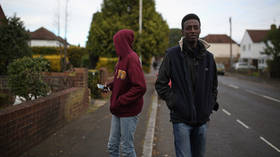UK accused of ‘unashamed racism’ in refugee policy

The British government has been accused of operating an “unashamedly racist” refugee system by denying safe and legal passage to people escaping conflict in Sudan while providing those options for those fleeing Ukraine, immigration experts told The Guardian.
“The blatant refusal to provide the level of sanctuary and safety for Sudanese refugees in comparison to white Ukrainians has firmly exposed the unashamedly racist thinking at the heart of immigration legislation,” Fizza Qureshi, chief executive of the Migrants’ Rights Network, told the British outlet on Sunday.
She accused the Home Office of having created a “segregated refugee system.”
UK Foreign Secretary James Cleverly said London had coordinated “the longest and largest evacuation of any Western country” after the final flight from Port Sudan departed on May 3.
More than 2,450 people were reportedly evacuated on 30 flights, the majority of whom were British nationals and their dependents. The UK also announced it would provide an initial £5 million ($6.3 million) of “life-saving aid to help meet the urgent needs of those fleeing the violence.”
However, The Guardian noted that “no safe and legal routes have been made available to help Sudanese refugees flee,” and there is “no sign” of any new scheme to deal with the fallout of the conflict.
Meanwhile, the report said nearly 300,000 visas had been issued to Ukrainian refugees, including 193,900 under the home sponsorship scheme, which began in March 2022, and 94,900 for a family program that allows them to reunite with family members already living in the UK.
Caitlin Boswell, policy and advocacy manager for the Joint Council for the Welfare of Immigrants (JCWI), told The Guardian that the government develops policies affecting those seeking safety “along stark racial lines.”
Raga Ahmad of the Sudanese Community and Information Center in London also claimed that people from his country “are treated differently to Ukrainians,” adding that “color and race should not matter when there is a war.”
In response to the allegations, a UK government spokesperson said it was “wrong to compare and set vulnerable groups against each other,” and insisted that preventing a humanitarian crisis in Sudan was a priority.
Last month, the Refugee Council said the UK Home Office had the power to help more but had failed to do so.
“It has significant discretion it can use to grant visas, particularly in response to exceptional circumstances, but has decided not to,” said the council’s chief executive, Enver Solomon. He added that there was a need to prioritize safe routes for refugees in the same way that was done for Ukrainians last year.













